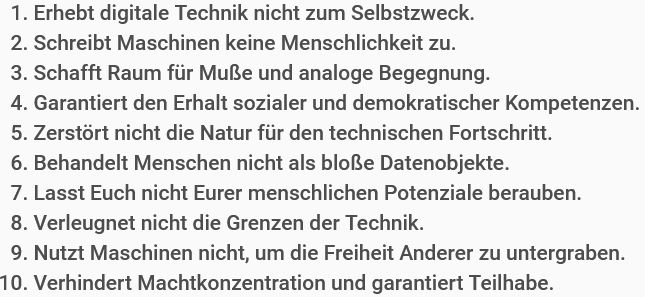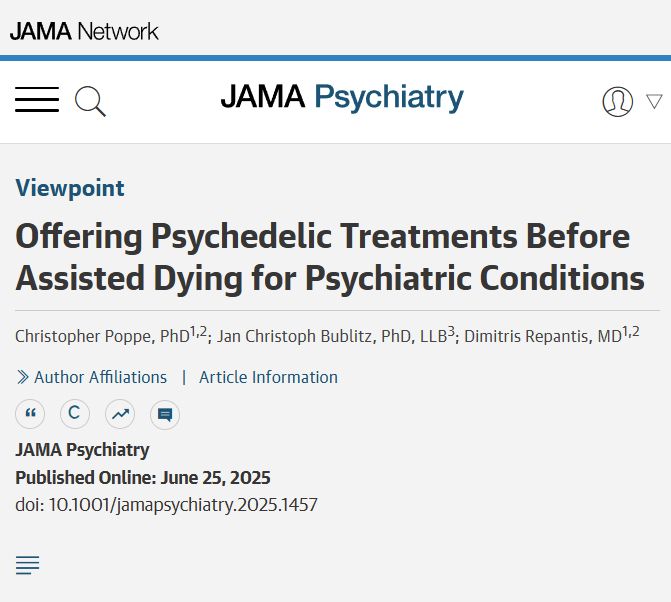
link.springer.com/article/10.1007/s12152-025-09612-6
#neuroethics #bioethics #philtech #techgovernance
@jcbublitz.bsky.social
Legal Scholar @UHH Law & Philosophy, Psychology, Neuroscience Advocate for the human right to freedom of thought Currently PI of research projects on legal & ethical issues of Neurotechnology, Psychedelics, & Virtual Reality Account for digital note taking

link.springer.com/article/10.1007/s12152-025-09612-6
#neuroethics #bioethics #philtech #techgovernance
6/ A precautionary, evidence-based approach is essential. We must not get this wrong. We therefore call for:
• a moratorium on non-medical invasive neurotech.
• development of a mandatory Mental Impact Assessment
• a ban on non-medical implants in children
Read the open access paper:
5/ With neurotech, the stakes are higher—interventions act directly on neural activity. Implantable not only increase “bandwidth”, as often said. Rather, they open new bidirectional channels between brain and digital tech. This will substantially increase risks.
19.10.2025 19:12 — 👍 0 🔁 0 💬 1 📌 04/ Recent digital technologies (smartphones, social media) provide a clear warning: They have scaled globally before their mental impact is understood. After a decade, individuals, parents, and societal institutions such as schools still struggle to find appropriate ways of using them.
19.10.2025 19:12 — 👍 0 🔁 0 💬 1 📌 03/ Without such tests, the effects on the human mind are unclear, people cannot make informed use decisions. The Assessment requires interdisciplinary efforts and the involvement of disciplines such as phenomenology, much broader than what is demanded by current regulations.
19.10.2025 19:12 — 👍 1 🔁 0 💬 1 📌 02/ We propose a moratorium on implantable non-med neurotechnologies until their effects on the human mind are properly understood. Specifically, devices should undergo a Mental Impact Assessment, a systematic evaluation of psychological and cognitive effects under realistic use conditions.
19.10.2025 19:12 — 👍 0 🔁 0 💬 1 📌 0🧠 New paper: “A Moratorium on Implantable Non-Medical Neurotech”
As Neuralink, Synchron, and possibly soon MergeLab funded by OpenAI push the frontier, we ask: are we ready for Brain-Computer Interfaces outside medicine?
➡️Our new paper says: not yet.

"Kein Punkt kann für sich alleine stehen" - Yayoi Kusama
14.10.2025 20:16 — 👍 0 🔁 0 💬 0 📌 0The report also suggest to include freedom of thought in impact assessments, which echoes my idea of a Freedom-of-Thought Impact Assessment for digital technologies.
#neuroethics #humanrights #freedomofthought #technologygovernance

Freedom of Thought: The OSCE Office for Democratic Institutions and Human Rights has just published a policy report on freedom of thought, AI, and neurotechnology. I am honored to have contributed and like how it describes the right and applies it to social media.../
www.osce.org/odihr/597450
For those interested in the chapter, it is on SSRN now
papers.ssrn.com/sol3/papers....
#legaltheory #philosophyoflaw #criminallaw
We invite scholars from around the world to submit their neuroethics research for presentation at the Neuroethics 2026 conference next April — with opportunities to present virtually or in-person at locations in the U.S., Italy and South Africa.
neuroethicssociety.org/meeting/neur...

"Nur Gott darf Punkte setzen" - László Krasznahorkai
www.deutschlandfunkkultur.de/nur-gott-dar...

„10 Regeln für die Digitale Welt“: 1. Erhebt digitale Technik nicht zum Selbstzweck. 2. Schreibt Maschinen keine Menschlichkeit zu. 3. Schafft Raum für Muße und analoge Begegnung. 4. Garantiert den Erhalt sozialer und demokratischer Kompetenzen. 5. Zerstört nicht die Natur für den technischen Fortschritt. 6. Behandelt Menschen nicht als bloße Datenobjekte. 7. Lasst Euch nicht Eurer menschlichen Potenziale berauben. 8. Verleugnet nicht die Grenzen der Technik. 9. Nutzt Maschinen nicht, um die Freiheit Anderer zu untergraben. 10. Verhindert Machtkonzentration und garantiert Teilhabe.
'10 Regeln für die Digitale Welt' sind nun "in der Welt"! 😊
Ich durfte sie in einer spannenden Gruppe mitdefinieren, u.a. mit @jurgenpfeffer.bsky.social und @paulnemitz.bsky.social.
Hier eine der vielen News dazu:
news.vm.uni-freiburg.de/de/newsarchi...
Kommentare sind sehr willkommen!
1/2
Freue mich, später im Deutschen Theater zu sprechen. Wer vorbeikommen möchte...
www.deutschestheater.de/programm/pro...

Just received my contributor's copy of the CUP handbook on Experimental Jurisprudence by @kevintobia.bsky.social, which may well beome the prime reference for anyone interested in the field, given the many interesting chapters and leading authors.
16.09.2025 13:13 — 👍 7 🔁 0 💬 1 📌 0
📣 Exciting Call Papers for The Journal of Human Rights/Zeitschrift für Menschenrechte: „New Technologies and Human Rights“. Submissions from various disciplines welcome. Read more here: www.humanrights.fau.eu/2025/08/08/c...
15.08.2025 08:54 — 👍 9 🔁 7 💬 0 📌 0
Number of judicial opinions that cite "A Theory of Law": 9
20.07.2025 04:40 — 👍 101 🔁 14 💬 8 📌 1
Rund 300 Rechtswissenschaftler und Ex-Verfassungsrichter melden sich in einem offenen Brief zu Wort. Sie kritisieren darin den Umgang mit Brosius-Gersdorf, eine "unsachliche Debatte" und "mangelnde Vorbereitung" seitens der Politik.
14.07.2025 13:30 — 👍 393 🔁 146 💬 13 📌 16
Honored to give a keynote later at UOC Barcelona on human rights and neurotechnology. Interview with me here:
www.uoc.edu/en/news/2025...

In a stunning reversal, the Senate voted 99-1 this morning to strip from Trump's big bill a 10-year moratorium on state-level AI regulations.
Gift link to my story on how it happened and who's celebrating: wapo.st/3TOyiaG

New Viewpoint: Countries allowing assisted suicide should offer candidates psychedelics and support to change their minds. If we truly value life, shouldn't we explore every therapeutic option - even controversial ones - before accepting that suffering is untreatable?
ja.ma/4l2gdls
5/ (Our correspondence was intended for publication before negotiations concluded but it remains relevant). Read it here:
www.nature.com/articles/s44...

4/ ... is matter of human dignity. States should use maximum available resources for making them available. www.youtube.com/watch?v=MGSo...
20.06.2025 18:17 — 👍 2 🔁 0 💬 1 📌 03/ To avoid this impression, we call on states to use its implementation as an opportunity to live up to their obligations and fill them with life. In particular, we think that providing devices or prostheses that restore essential human capacities as speech, communication or movement ...
20.06.2025 18:17 — 👍 0 🔁 0 💬 1 📌 02/...the Recommendation focuses more on risks than on potential benefits. The UN Convention on the Rights of Persons with Disabilities established numerous important binding obligations of states which are broader than those of the Recommendation. This might be seen as a setback.
20.06.2025 18:17 — 👍 0 🔁 0 💬 1 📌 01/ UNESCO member states recently concluded negotiations on the first global Recommendation on the Ethics of Neurotechnology, to be adopted in November. Our comment in Nature Mental Health examines it through a disability rights lens. While people with disabilities are primary neurotechnology users..
20.06.2025 18:17 — 👍 2 🔁 0 💬 1 📌 0
Also interesting, 𝘢𝘷𝘢𝘵𝘢𝘳.
From Sanskrit, the earthly incarnation of godly powers.

On the etymology of 𝘷𝘪𝘳𝘵𝘶𝘢𝘭 𝘳𝘦𝘢𝘭𝘪𝘵𝘺:
Manly strength (vir) --> inherent powers --> implicit powers --> something not really there, irrealis -> virtual.
(from Heim, The Paradox of Virtuality
academic.oup.com/edited-volum... )
2/ At least when used without consent and outside of medical treatment. What would this imply? Read more in our latest article (behind paywall, send me a message for the file).
24.05.2025 09:39 — 👍 0 🔁 0 💬 0 📌 0